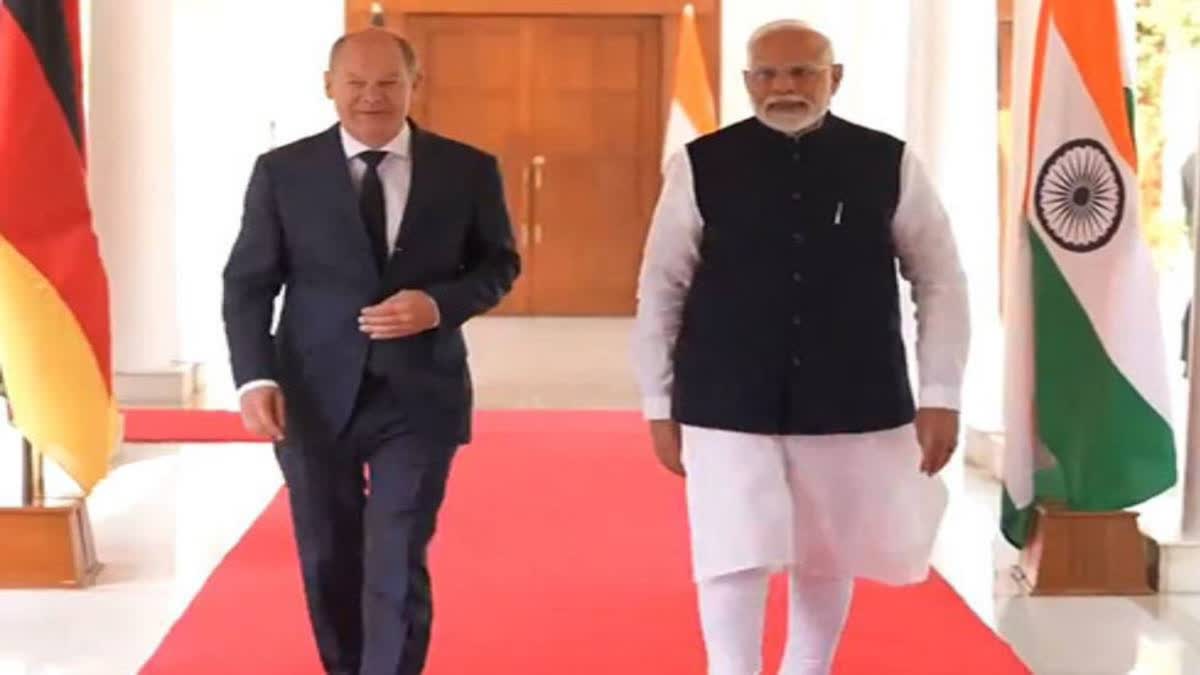New Delhi: As 2025 begins with promising momentum, the world is closely watching pivotal elections that could have far-reaching implications. In February, Germany, the largest economy in Europe, will hold its first elections since the onset of the Russia-Ukraine conflict. Given the robust relationship between India and Germany, the results of this election could possibly influence the dynamics of their bilateral relations.
In an exclusive interview with ETV Bharat, India’s former ambassador to Germany, Amit Dasgupta said, “New Delhi will engage with whosoever the German people elect, unless there is an evidence-based threat that the elected government is adopting policies that are inimical to India’s interests. There is nothing to suggest that this would be the case. Foreign policy and bilateral relations are also impacted by changed and changing global developments and realities, such as the change of guard in the White House and new policies (if any) that are introduced, the wars in Ukraine and Gaza and neighbouring countries.
Dasgupta stated that if US policies adversely target EU countries through high tariffs, India is likely to emerge as a key trading partner for Germany (and other EU countries). Europe’s focus on climate change and environmental degradation could also emerge as a key collaboration sector vis-à-vis India. The key influencer in global foreign policy recrafting would be known only after a formal change in guard in the White House and a formal enunciation of US foreign policy.
He noted that India and Germany have enjoyed strong ties not simply at a people-to-people level but in the economic, trade and investments, defence and security collaboration, education and research links, collaboration in critical technologies, the environmental issues (especially renewables). Also shared aspirations on restructuring the UN through the G4 initiative. These received significant fillip during the Merkel years and have been carried forward during Scholz’s tenure.
“Germany is India’s largest trading partner in Europe. Germany plays a significant role in the EU. Germany also recognizes India’s growing stature in global affairs. As a consequence, both countries have aligned interests as resilient democracies. Germany’s global significance arises from its image as ‘the engine of growth’ in Europe. This is its core strength and would remain its core focus post-elections as well. India would continue to remain a significant trade and investment partner in this regard”, he added.
Talking about the likely outcome of the German Federal elections, Dasgupta said, “Germans are getting ready to elect a new Bundestag after German Chancellor Olaf Scholz lost a confidence vote in December 2024. It is anyone’s guess as to who would win the elections. No single party is expected to win an absolute majority. According to a poll, at least forty percent of the polled Germans are unhappy about the political future of Germany and the performance of the ruling SPD party. Scholz simply could not match the charisma and visionary leadership of Angela Merkel, who was widely regarded as one of the most influential leaders on the world stage”.
“The Conservative Christian Democrats (CDU) and (their sister party in Bavaria) CSU (Christian Social Union) are in the lead but not likely to win an absolute majority. The majority of Germans – driven by historical guilt and the shameful Nazi years – have traditionally rejected – even shunned – far-right politics as represented through the AFD. Elon Musk’s provocative endorsement of AfD could have the unintended consequence of uniting Germans, across party lines, against outside interference and defeating AFD”, explained the former diplomat.
Furthermore, when asked if a change in government in Germany influenced India's trade policies with the EU, Britta Petersen, a German journalist and a think-tank expert said, “The India-EU trade agreement has been high on the agenda for both sides for quite some time now. However, obstacles on both sides remain. With a more conservative government in Germany, the country will be more likely to scrap emphasis on workers’ rights and environmental standards, which might ease negotiations, but will neither help the poor nor the environment. Germany will remain interested in extending economic cooperation with India, as it wants to become less dependent on China”
On being asked if German elections will influence Europe’s stance on important issues such as climate change and global security, especially concerning India, Petersen opined that as long as there is no involvement of the hard right in the government, Germany will remain a reliable partner in the EU. “The conservatives will strengthen the German Federal Army. Europe will overall, invest more in its own security. However, a lot will depend on the unpredictable Donald Trump, especially in the wake of the Ukraine war. The emphasis on climate change is waning under the new, conservative and right-wing governments in Europe, which is, in my view, denial of the most stupid order. Europeans have accommodated the fact that India will not break away from Russia, which puts a limit to relations”, she added.
“The German elections are characterised by two factors: The failure of the so-called “traffic light” coalition under Chancellor Olaf Scholz which could not manage to overcome differences between Scholz’ Social Democrats (SPD) and the other two coalition partners, the Greens and the Liberal Democrats (FDP). Characterised by regular infighting, this centre-left coalition imploded prematurely which led to the upcoming snap elections. The failure of the centre-left has led to a rise in popularity of the hard-right AFD and as well of the Christian Democrats (CDU) led by Friedrich Merz, who is likely to become the next Chancellor.
The rise of the far-right follows a general trend in the West. It is unlikely that the AFD will come to the government, as the CDU under Merz has ruled out a coalition with them. Merz will have to stitch together a coalition with the SPD or the Greens or both. How successful this coalition can be, will depend on how strong these parties will come out on election day. It is unclear whether the FDP or The Left party will make it to the next parliament, as they might not win the required 5 percent of the popular vote. If they do, there will be a few more players in the coalition game. In any case, Germany will become more conservative, more anti-immigration, less interested in climate change and green energy, more focussed on reviving the German economy under a CDU-led government”, she added.
India and Germany have cooperated on security issues, particularly in the context of regional and global challenges. They both advocate for a rules-based international order and are committed to multilateralism. The relationship between India and Germany is multifaceted, encompassing trade, technology, culture, and cooperation on global challenges. It continues to grow stronger as both nations pursue shared interests in a rapidly changing world.
However, no matter whosoever comes to power, Germany will likely continue its leadership in EU policies, particularly regarding trade and sustainability, with India being a significant partner in tackling global challenges. India, as a rising global power, will play a central role in multilateral diplomacy, and its relationship with Germany will likely strengthen, especially in sectors like climate change, trade, and technology.



